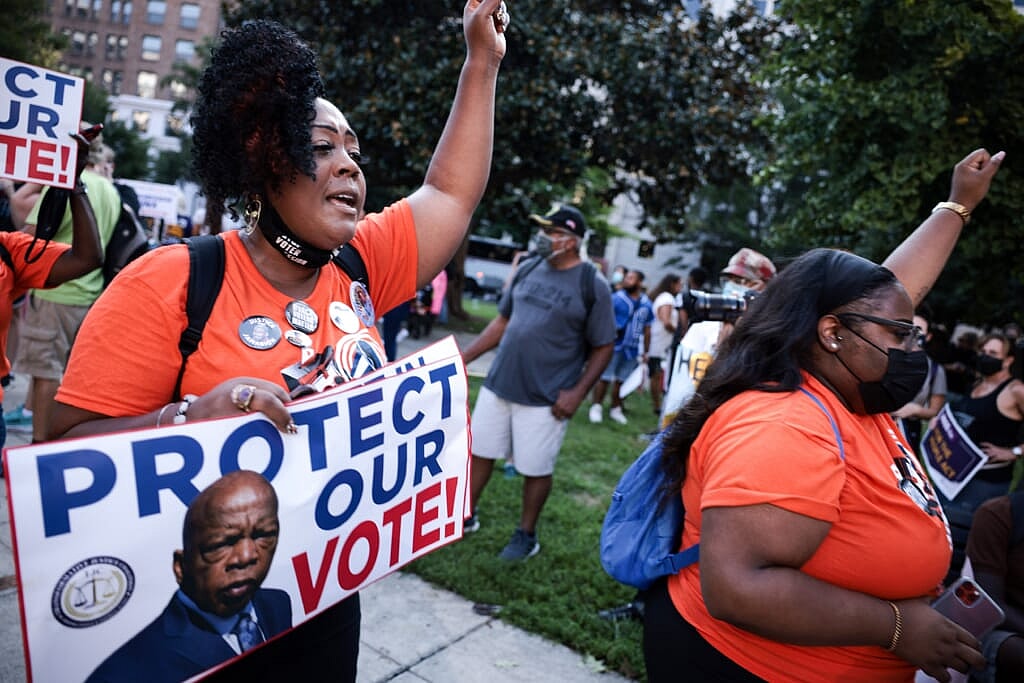Voting rights activists led by Martin Luther King III are pressing the Senate hard after weeks of demonstrations and meetings with congressional leaders on Capitol Hill. Their activism follows a relentless push by Republicans in several states to make it harder to vote.
“I am truly disappointed at where we find ourselves and our nation right now,” said King. “In 1968 my father was killed in Memphis, Tennessee,” King began as he spoke at a rally in a shady park with the U.S. Capitol building in the background.

A compromise bill on voting rights was introduced in the U.S. Senate on Tuesday by Senate Democrats Amy Klobuchar (D-Minn.), Tim Kaine (D-VA), Angus King (I-Maine), Joe Manchin (D-WV), Jeff Merkley (D-Ore.), Alex Padilla (D-Calif.), Jon Tester (D-Mont.), and Reverend Raphael Warnock (D-Ga.).
“The Freedom to Vote Act” is a compromise bill resulting from issues West Virginia Democrat Manchin had to certain provisions in the For The People Act. Manchin has been a barrier to ending the filibuster which would make the passage of voter protection legislation much easier. On Tuesday he told reporters on Capitol Hill that his Republican colleagues believe the voting rights bill represents “a federal takeover.”
Even though moderate Senate Democrats are on board, the Freedom to Vote Act passing will be an uphill battle. Activists understand the clock is ticking and they are applying more pressure on lawmakers to act fast and protect the ballot ahead of next year’s midterm elections — and while Democrats still have a slim majority in Congress.
Many activists have grown tired of having to “save” the Democratic Party election cycle after election cycle with their grassroots organizing. They understand how hard voting rights victories are to win but are pushing President Joe Biden to use the full power of his office to protect the ballot.

“As someone who has worked with C.T. Vivian and Amelia Boyton we know that we shall not be moved! When we have that belief we can move mountains. We can end the filibuster. We will get that one step closer — we have some work that we have to do!” exclaimed Cliff Albright, executive director of Black Voters Matter at the rally across the street from the U.S. Capitol.
“The Freedom To Vote Act has my strong support,” tweeted Stacey Abrams as Albright was speaking on Capitol Hill. Abrams commended the lead sponsor, Sen. Klobuchar, and Sen. Warnock, who was involved in negotiations on the new compromise bill.
The bill would make Election Day a national holiday and require states to allow a minimum of 15 consecutive days of early voting — including weekends. It also mandates that voters can request access to a mail-in ballot. The legislation also mandates public disclosure of donors to “dark money” organizations who can now influence elections in secret.
Voter suppression targeted at African Americans has always been a part of American history. Recent efforts began a year after the election of President Barack Obama in 2008. The efforts have become even more aggressive after the election of President Biden, Sen. Warnock and Sen. Jon Ossoff in Georgia. Immediately following Biden’s victory came false claims by Donald Trump that the 2020 presidential election was stolen.

King and the other activists have been applying pressure on President Biden and lawmakers at the White House and on Capitol Hill, on both sides of the aisle, for months. Republicans are opposing changes in the law on the federal level that would make voting easier. They claim their party’s recent changes on the state level have been made to prevent fraud.
“Yesterday we were here to deliver a letter to Mitch McConnell, the Minority Leader … We were requesting a meeting… his [McConnell’s] office refused to even allow us to drop a letter off. Now how do you call that a democracy? Insulting,” King added.
In 2013, the U.S. Supreme Court weakened Section 5 of the 1965 Voting Rights Act, which ended the requirement that states with a pattern or history of racial discrimination clear changes in voting laws with the federal government.
Lauren Victoria Burke is an independent journalist and the host of the podcast BURKEFILE. She may be contacted at [email protected] and on twitter at @LVBurke.
Have you subscribed to theGrio’s “Dear Culture” podcast? Download our newest episodes now!
TheGrio is now on Apple TV, Amazon Fire and Roku. Download theGrio.com today!
jwp-video n=”2″]

